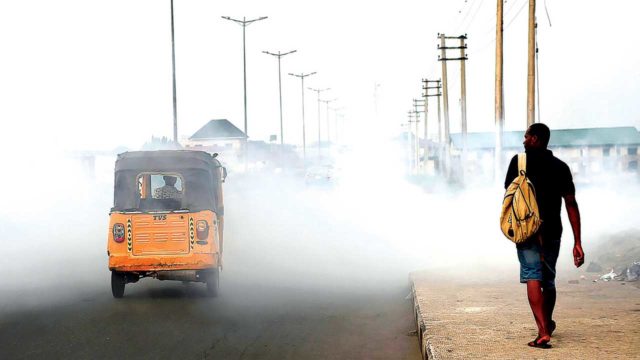News
WHO Alerts To Rising Climate-related Health Emergencies In Africa

…Says 99% of world’s population breathe polluted air
A new analysis published, yesterday, by World Health Organisation (WHO), showed that climate-related health emergencies are on the rise in Africa, accounting for more than half of public health incidents recorded in the region over the past two decades.
The study found that of the 2121 cases recorded in the African region between 2001 and 2021, 56 per cent were climate-related.
It indicated that 25 per cent more climate-related events were recorded during the period.
The report came ahead of the World Health Day holding today, April 7, under the theme, “Our Planet. Our Health.”
The global agency is calling on governments to, among other recommendations, prioritise human’s well-being in all key decisions, stop new fossil fuel explorations and subsidies, tax polluters and implement air quality guidelines.
WHO Regional Director for Africa, Dr. Matshidiso Moeti, in a statement, said: “Climate change is one of the greatest threats to humanity. The entire foundation of good health is in jeopardy with increasingly severe climatic events. In Africa, frequent floods, water and vector-borne diseases are deepening health crises. Although the continent contributes the least to global warming, it bears the full consequences.”
The WHO analysis found that water-borne diseases accounted for 40 per cent of the climate-related health emergencies in the period under review.
In Africa, diarrhoeal diseases are the third leading cause of death in under-five children. A significant proportion of these deaths is preventable through safe drinking water, adequate sanitation and hygiene.
The examination also showed that vector-borne diseases, notably yellow fever, accounted for 28 per cent of the climate-related health emergencies, while zoonotic diseases, specifically Congo-Crimean haemorrhagic fever, were the third most prevalent. Congo-Crimean haemorrhagic fever is a viral disease transmitted to people from ticks and livestock and has an outbreak fatality rate of up to 40 per cent.
Natural disasters have also spiked dramatically since 2010, with 70 per cent of all-natural disasters occurring between 2017 and 2021. Floods were the most frequent event, accounting for 33 per cent of all the reported natural disasters.
Africa is also grappling with other significant health impacts linked to climatic shocks, including malnutrition and hunger due to adverse weather on agricultural production, long-term health and development challenges in children, as well as other infectious diseases such as malaria.
On the continent, climate change is likely to expand the range of malaria high-risk zones, according to a report by the Netherlands-based Global Centre on Adaptation. Even though malaria mortality has decreased from 840,000 deaths in 2000 to 602,000 fatalities in 2020, the disease remains a major health challenge in Africa.
Besides, the global organisation said 99 per cent of the global population now breathe air that exceeds prescribed quality limits due to highest level of exposure, thereby posing serious health risks.
It also revealed that over 6,000 cities in 117 nations are now monitoring air quality, but residents are still breathing unhealthy levels of fine particulate matter and nitrogen dioxide, especially people in low and middle-income countries.
WHO’s Director-General, Dr. Tedros Ghebreyesus, in a statement, affirmed that the “current energy concerns highlight the importance of speeding up the transition to cleaner and healthier energy systems,” adding that the global community must fall back on another viable alternative of energy source.
“High fossil fuel prices, energy security and the urgency of addressing the twin health challenges of air pollution and climate change underscore the pressing need to move faster towards a world that is much less dependent on fossil fuels,” he added.
Ghebreyesus observed: “These novel discoveries have incited the organisation to underscore the essence of sensitising the global community to curb the use of fossil fuel, while invariably reducing air pollution level. Scientifically, both particulate matter and nitrogen dioxide are strong indicators of polluted air, primarily produced by human activities of burning fossil fuels.”
He continued: “We observed that particulate matter, especially the smaller molecules known as PM2.5, is capable of penetrating deep into the lungs and entering the bloodstream, causing damage to the cardiovascular system, respiratory tract, brain and other organs.”
Also speaking, WHO Director, Department of Environment, Climate Change and Health, Dr. Maria Neira, stated that these deaths, unlike the COVID-19 pandemic, could be effectively prevented with the proper environmental attitude.
“Nitrogen Oxide, on the other hand, comes from emissions from cars, trucks and buses, power plants and industries. This pollutant is primarily associated with respiratory diseases, especially asthma,” she clarified.
-

 Opinion5 days ago
Opinion5 days agoDon’t Pull the Plug: Why Nigerians Are Pleading for the U.S. to Extend Its Police Training Program — and Why It Must Synergize With New Military Arrivals
-

 Crime4 days ago
Crime4 days agoVigilante Reportedly Shoots Colleague Dead In Plateau
-

 News3 days ago
News3 days agoRamadan: Osun Cleric Urges Compassion Among Muslims As Asejere Distributes Relief Materials To 537 Beneficiaries
-

 Crime5 days ago
Crime5 days agoMan Shot Dead In Ambush Along Jol-Sho Road In Plateau

